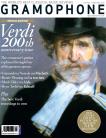Texte paru dans: / Appeared in:
*

GRAMOPHONE (02/2013)
Pour s'abonner /
Subscription information
DG
DG4810062

Code-barres / Barcode : 0028948100620
Reviewer: Jonathan Freeman-Attwood
Concept Bach programme with Stutzmann as singing director
Nathalie Stutzmann’s credentials as a Bach singer are well
established, as genuine and unmistakable a contralto voice as we’ve heard in his
music on record. Now she presents a programme of hand-picked movements (mainly)
from the cantata depository as singer- director — a combination of tasks by
which, on this evidence, she appears distinctly unfazed.
Despite elegance shorn from the Sinfonia of BWV42 (an inauspicious start to have
this gently sanguine concerto join the rat race of the fashionably fast) and the
Brandenburg No 1 refurbishment in BWV174 Stutzrnann has an ear for
captivating attention and her orchestra, Orfeo 55, are often as responsive to
her ‘stick’ as they are to her dark-hued vocalisation. Not al of this reaps its
rewards. While ‘Air on the G string’ is proud and poised, ‘Bist du bei mir’
swoons and arches at times like a send-up, stylistically very wide of the mark
for an otherwise period-aware enterprise.
Immediacy of sentiment and fresh anticipation of the core ‘conceit’ of each one of these disparate movements is Stutzmann’s strongest suit. Some will relish her sparkling take on ‘Nichts kann mich erretten’ — it is quite a dazzling vocal display — and other highlights include a Gleichwie der Regen (BWV18) and a stately Sinfonia of BWV4, redolent of Nadia Boulanger — though the link to ‘Stirb in mir’ (BWV169) is peculiar to say the least, juxtaposing two remote Bachian sound worlds.
Bach’s oeuvre has been trawled with some care but, inevitably, the de-contextualisation of movements from so many complete liturgical and rhetorical musical ‘essays’ compromises their impact — as does the pragmatic inclusion of famous ‘potboilers’ for their own sake: the Gloria from the Mass in B minor and ‘Jesu Joy’ seem curiously out of place.
The main question is whether Stutzmann’s rich voice
constitutes the perfect vehicle for a quasi-compilation; the instrument is, in
any case, something of an acquired taste but surely would be less so without the
straight-tone bulging (often just under the note) which so regularly dominates
the landscape. This is, overall, rather too much of a good thing — but still
admire the sparkle and committed intent.
Cliquez l'un ou l'autre
bouton pour découvrir bien d'autres critiques de CD
Click either button for many other reviews


